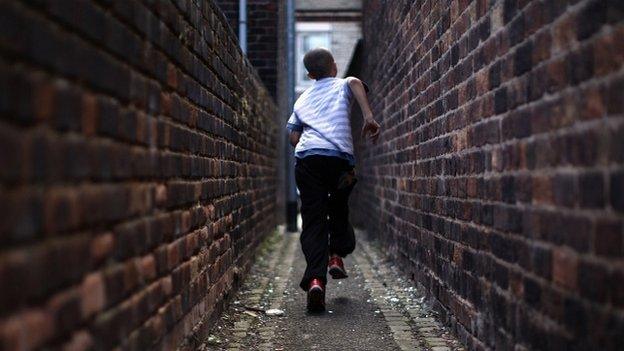Healthy breakfasts 'help pupils do well'
- Published
Pupils and head teacher Jane Jenkins at Moorland Primary School in Cardiff say their breakfast club gives them a good start to the day
Children who eat a healthy breakfast are more likely to do well in end of primary school assessments than those who do not, a study suggests.
It also found unhealthy food such as sweets had no positive effect.
It is the first time a direct link between pupils' breakfast quality and consumption and their educational attainment has been demonstrated.
The Cardiff University study asked 5,000 nine to 11-year-olds to list what they ate in 24 hours.
The study involved more than 100 primary schools in Wales and built on research started 10 years ago.
It found eating unhealthy items such as sweets and crisps for breakfast, reported by one in five children, had no positive impact on how they performed in tests.
Pupils were asked to list all food and drink consumed over a period of just over 24 hours.
Their results in Key Stage 2 teacher assessments were then followed up by researchers between six and 18 months later.
The odds of achieving an above average performance was up to twice as high for pupils who ate breakfast, compared with those who did not.
'Concentration'
Alongside the number of healthy breakfast items, other dietary behaviours - including number of sweets and crisps, and fruit and vegetable portions consumed throughout the rest of the day - were all significantly and positively associated with educational performance.
Researchers claim the findings, published in the Public Health Nutrition, external journal, could have big implications for policymakers.
Lead author Hannah Littlecott, from Cardiff University, said the odds of achieving above average performance were up to twice as high for pupils who ate a healthy breakfast than for those who did not.
She said schools might see dedicating time towards improving health as an "unwelcome diversion" from teaching.
But she added: "Clearly, embedding health improvements into the core business of the school might also deliver educational improvements as well."
Co-author Dr Graham Moore said the data provided "robust evidence of a link between eating breakfast and doing well at school".
In Wales, most primary schools offer a free school breakfast funded by the Welsh government.
Kevin Davies, acting head of Ysgol y Wern Primary School in Ystalyfera, said it was obvious to teachers which pupils had not had a morning meal.
"By around 10am they start flagging. It has an effect on behaviour and concentration - some even fall asleep.
"So we have, in the past, taken them down to the kitchen to make sure they have something to keep them going until lunchtime."
"It's clear to us that those who come to our breakfast club and have the balance of foods they need are more attentive and keen to complete their work and that persists throughout the day."
Public Health Wales welcomed the study's findings, saying they support the case for schools to consider measures to improve children's diets.
- Published17 November 2015

- Published5 April 2015

- Published11 May 2015

- Published8 January 2013
